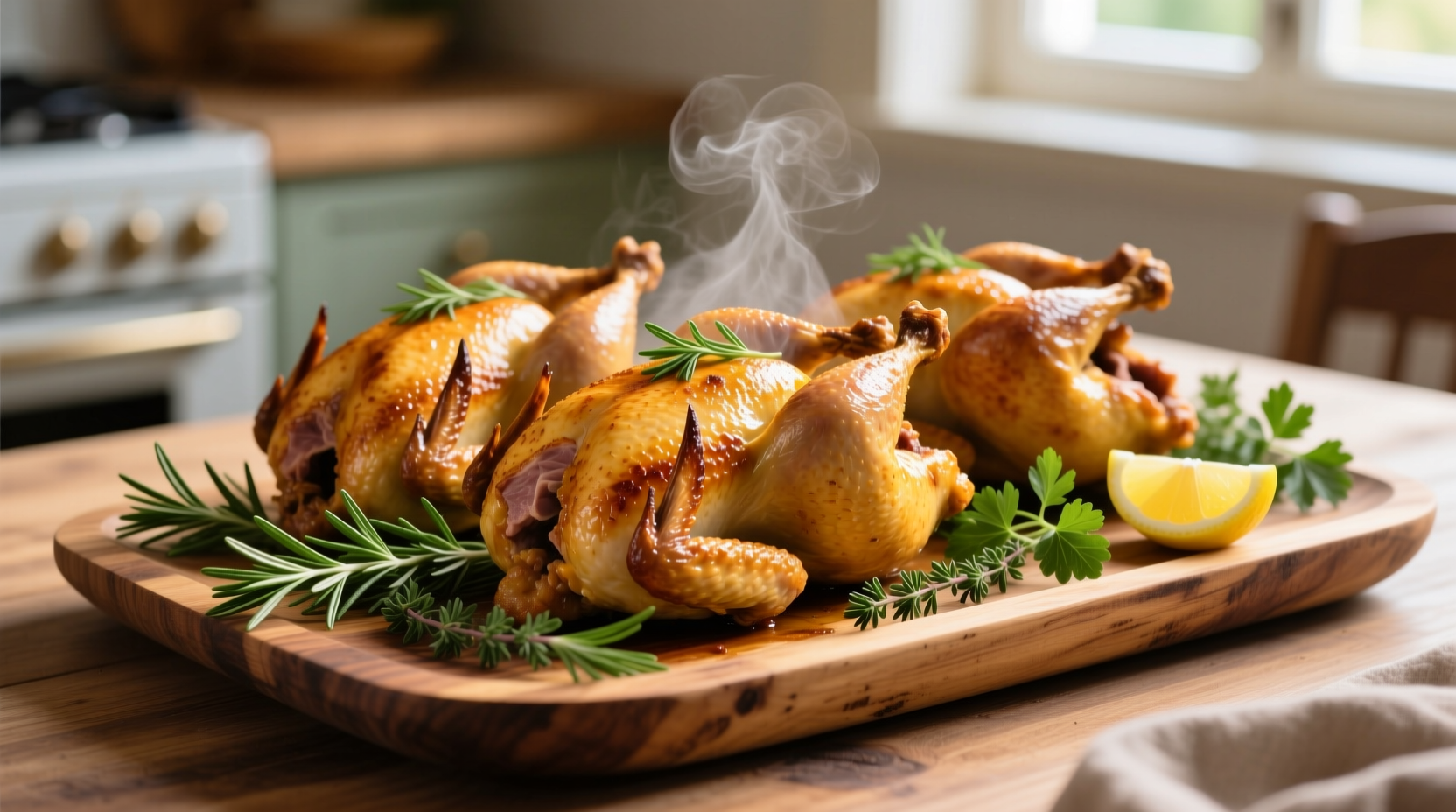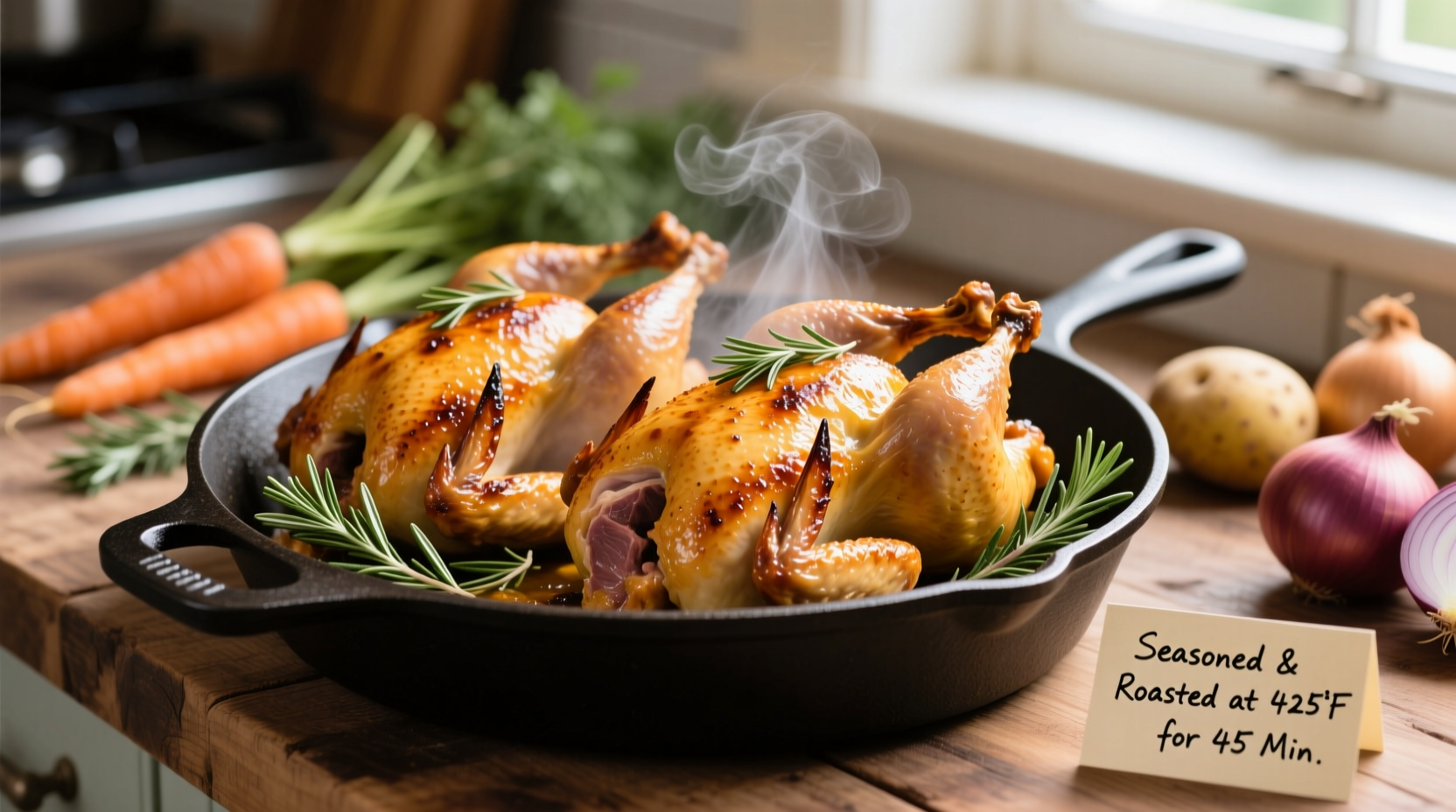Discover the perfect method for cooking Cornish hens that delivers crispy skin and juicy meat. This comprehensive guide walks you through every step from selection to serving, ensuring restaurant-quality results in your home kitchen. Whether you're preparing a special dinner or exploring new proteins, these small game birds make an impressive centerpiece when cooked properly.
Understanding Cornish Hens: What Makes Them Special
Cornish hens aren't actually hens nor a specific breed—they're young chickens harvested at 5-6 weeks old, weighing 1-2 pounds. Their small size means they cook quickly and serve one person perfectly. The American Poultry Association defines them as "a cross between Cornish and White Plymouth Rock chickens," prized for their tender meat and delicate flavor.
Preparation: Setting Up for Success
Proper preparation separates good results from exceptional ones. Follow these steps before cooking:
- Thawing: If frozen, thaw in the refrigerator for 24-48 hours. Never thaw at room temperature.
- Drying: Pat thoroughly with paper towels—this critical step ensures crispy skin.
- Trussing: Tuck wing tips and tie legs together with kitchen twine for even cooking.
- Seasoning: Apply oil or butter first, then generously season inside and out with salt, pepper, and your preferred herbs.
Professional chefs like Antonio Rodriguez emphasize that "seasoning under the skin creates flavor pockets that keep the meat moist during cooking." Gently loosen the skin over the breast and rub seasoning directly on the meat.
Optimal Cooking Methods Compared
While roasting produces the most reliable results, several cooking methods work well for Cornish hens:
| Method | Temperature | Cooking Time | Best For |
|---|---|---|---|
| Roasting | 375°F (190°C) | 45-55 minutes | Most consistent results, crispy skin |
| Grilling | Medium-high heat | 35-45 minutes | Smoky flavor, outdoor cooking |
| Broiling | High setting | 25-35 minutes | Quick cooking, extra-crispy skin |
Step-by-Step Roasting Instructions
Follow this proven method for perfect roasted Cornish hens:
- Preheat oven to 375°F (190°C) with rack in the center position
- Place hens breast-side up on a rack in a roasting pan
- Insert meat thermometer into the thickest part of the thigh
- Roast 45-55 minutes until thermometer reads 165°F (74°C)
- Check temperature in multiple spots to ensure accuracy
- Remove from oven and rest 10 minutes before serving
The USDA Food Safety and Inspection Service confirms that "poultry is safe to eat when all parts have reached a minimum internal temperature of 165°F (73.9°C)" (source). This temperature destroys harmful bacteria while preserving moisture.

Avoiding Common Mistakes
Even experienced cooks make these errors when preparing Cornish hens:
- Overcrowding the pan: Place hens at least 1 inch apart for proper air circulation
- Skipping the rest period: Resting allows juices to redistribute for maximum tenderness
- Guessing doneness: Always use a thermometer—visual cues alone are unreliable
- High initial heat: Starting too hot burns skin before interior cooks through
Serving Suggestions That Impress
Elevate your Cornish hens with these professional pairing recommendations:
- Classic: Serve with roasted root vegetables and a rich pan sauce made from drippings
- Mediterranean: Pair with lemon-herb couscous and roasted cherry tomatoes
- Asian-inspired: Accompany with jasmine rice and bok choy stir-fry
- Festive: Present with wild mushroom risotto and roasted garlic mashed potatoes
For presentation, Antonio Rodriguez recommends "placing the hen diagonally on the plate with the drumstick facing outward—this showcases the beautiful golden skin and makes carving easier for your guests."
Storage and Reheating Tips
Proper storage maintains quality if you have leftovers:
- Refrigerate within 2 hours of cooking in airtight containers
- Consume within 3-4 days for best quality
- To reheat: Place in 325°F (163°C) oven until internal temperature reaches 140°F (60°C)
- Avoid microwaving whole hens—this makes skin soggy











 浙公网安备
33010002000092号
浙公网安备
33010002000092号 浙B2-20120091-4
浙B2-20120091-4